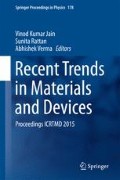Abstract
Lithium iron phosphate (LiFePO4) is an attractive cathode material for lithium-ion batteries. Among various issues, the most important concern is its low intrinsic electronic conductivity and slow lithium-ion diffusion across the LiFePO4/FePO4 phase boundary during charge/discharge processes which limit the rate performance of this material. Different strategies are being employed to improve its electrochemical performance. The physical technique such as ball-milling of LiFePO4 with carbon black followed by a unique synthesis route like microwave synthesis was used for formation of LiFePO4 which yielded smaller particle size and more uniform size distribution. This carbon coated nano material is electrochemically characterized by fabricating half cells using CR2032 hardware. The preparation of cathodes is required to be optimized to get good electrochemical properties. The ratio of cathode active material, conductive additive acetylene black and binder PVdF to form slurry was optimized by fabricating several coin cells and testing them rigorously. Specific capacities and cycle life obtained for various compositions are reported. For optimized composition, different C-rate discharge characteristics are reported.
Access this chapter
Tax calculation will be finalised at checkout
Purchases are for personal use only
References
A.K. Padhi, K.S. Nanjundaswamy, J.B. Goodenough, Phospho-olivines as positive-electrode materials for rechargeable lithium batteries. J. Electrochem. Soc. 144(4), 1188–1194 (1997)
B.L. Ellis, K.T. Lee, L.F. Nazar, Positive Electrode Materials for Li-Ion and Li-Batteries. Chem. Matter. 22(3), 691–714 (2010)
S.I. Nishimura, G. Kobayashi, K. Ohoyama, R. Kanno, M. Yashima, A. Yamada, Experimental visualization of lithium diffusion in LixFePO4. Nat. Mater. 7(9), 707–711 (2008)
J.M. Tarascon, M. Armand, Issues and challenges facing rechargeable lithium batteries. Nature 414, 359–369 (2001)
M.S. Whinttingham, Materials Challenges Facing Electrical Energy Storage. MRS Bull. 33, 411–420 (2008)
T. Ohzuku, R.J. Brodd, An overview of positive-electrode materials for advanced lithium-ion batteries. J Power Sources 174(2), 449–456 (2007)
D. Jugovic, D. Uskokovic, A review of recent developments in the synthesis procedures of lithium iron phosphate powders. J. Power Sources 190(2), 538–544 (2009)
B. Scrosati, J. Garche, Lithium batteries: Status, prospects and future. J. Power Sources 195(9), 2419–2430 (2010)
M. Higuchi, K. Katayama, Y. Azuma, M. Yukawa, M. Suhara, Synthesis of LiFePO4 cathode material by microwave processing. J. Power Sources 119–121, 258–261 (2003)
K.S. Park, J.T. Son, H.T. Chung, S.J. Kim, C.H. Kim, C.H. Lee, H.G. Kim, Synthesis of LiFePO4 by co-precipitation and microwave heating. Electro Chem. Commun. 5(10), 839–842 (2003)
L. Wang, Y. Huang, R. Jiang, D. Jia, Preparation and characterization of nano-sized LiFePO4 by low heating solid-state coordination method and microwave heating. Electro chimica Acta 52(24), 6778–6783 (2007)
S. Beninati, L. Damen, M. Mastragostino, MW-assisted synthesis of LiFePO4 for high power applications. J. Power Sources 180(2), 875–879 (2008)
A.V. Murugan, T. Muraliganth, A. Manthiram, Rapid Microwave- Solvothermal Synthesis of Phospho-olivine Nanorods and Their Coating with a Mixed Conducting Polymer for Lithium-Ion BatteriesElectro chemistry. Communications 10(6), 903–906 (2008)
Y.V. Bykov, K.I. Rybakov, V.E. Semenov, High-temperature microwave processing of materials. J. Physics D: Applied Physics 34, R55–R75 (2001)
W. Li, J. Ying, C. Wan, C. Jiang, J. Gao, C. Tang, Preparation and characterization of LiFePO4 from NH4FePO4·H2O under different microwave heating conditions. J. Solid State Electrochemistry 11(6), 799–803 (2007)
Y. Zhang, H. Feng, X. Wu, L. Wang, A. Zhang, T. Xia, H. Dong, M. Liu, One - step microwave synthesis and characterization of carbon modified nano crystalline LiFePO4. Electrochim. Acta 54(11), 3206–3210 (2009)
D. Liu, L.-C. Chen, T.-J. Liu, T. Fan, E.-Y. Tsou, C. Tiu, An effective mixing for Lithium-ion battery slurries. Adv. Chem. Eng. Sci. 4, 515–528 (2014)
S.E. Trask, Y. Li, J.J. Kubal, M. Bettge, B.J. Polzin, Y. Zhu, A.N. Jansen, D.P. Abraham, From coin cells to 400 mAh pouch cells: enhancing performance of high capacity lithium ion cells via modifications in electrode constitution and fabrication. J. Power Sour. 259, 233–244 (2014)
S.J. Harris, P. Lu, Effects of Inhomogeneities – Nanoscale to mesoscale-on the durability of Li- ion batteries. J. Phys. Chem. C 117, 6481–6492 (2013)
H.Y. Tran, G. Greco, C. Taubert, M. Wohlfahrt, Mehrens, W. Haselrieder, A. Kwade, Influence of electrode preparation on the electrochemical performance of LiNi0.8 Co0.15Al0.05O2 composite Electrodes for lithium-ion batteries. J. Power Sources 210, 276–285 (2012)
T.V.S.L. Satyavani, A.S. Kumar, M. Senthilkumar, P.S. Subbarao, Optimization of particle size to improve dc conductivity of microwave synthesized carbon coated nano LiFePO4 for Li-ion based batteries for underwater applications, in Accepted for International Workshop on Physics of Semiconductor Devices, IWPSD (2015)
T.V.S.L. Satyavani, A.S. Kumar, P.S. Subbarao, Nano lithium iron phosphate cathode material for Li-ion based batteries for underwater applications. Phys. Semicond. Dev. 721–723 (2014) (Springer)
Acknowledgments
We wish to thank Sri C.D. Malleswar, Director, N.S.T.L. for his encouragement to carry out this work. We wish to acknowledge Sri M. Senthilkumar, Sri K. Sahoo and Sri V. Rajesh Kumar for their cooperation in carrying out this work.
Author information
Authors and Affiliations
Corresponding author
Editor information
Editors and Affiliations
Rights and permissions
Copyright information
© 2017 Springer International Publishing Switzerland
About this paper
Cite this paper
Satyavani, T.V.S.L., Srinivas Kumar, A., Srinivas, M., Subbarao, P.S.V. (2017). Optimization of Microwave Synthesized Carbon Coated Nano LiFePO4 Active Cathode Material Composition for Li-Ion Batteries. In: Jain, V., Rattan, S., Verma, A. (eds) Recent Trends in Materials and Devices. Springer Proceedings in Physics, vol 178. Springer, Cham. https://doi.org/10.1007/978-3-319-29096-6_30
Download citation
DOI: https://doi.org/10.1007/978-3-319-29096-6_30
Published:
Publisher Name: Springer, Cham
Print ISBN: 978-3-319-29095-9
Online ISBN: 978-3-319-29096-6
eBook Packages: Physics and AstronomyPhysics and Astronomy (R0)

